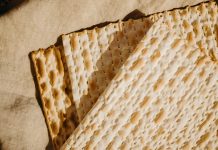While watching Bill Maher’s show on TV one night I had occasion to think about the Judaic culture I have inherited. Famous and infamous for his anti-religion stance (he thinks all religions are ridiculous, not just some), Maher was particularly confounded on the night I was watching about people who choose to change their religion as adults. What he said (and I paraphrase) is: I sort of get what it means to be born into a religion, but the idea of a fully rational adult choosing to believe in a lot of hocus pocus boggles the mind.
In my last column I wrote about a rift that occurred between my Chinese mother-in-law and myself shortly after my husband and I adopted and brought our beautiful daughter Willow home from China. I talked some about our clash of cultures and our different approaches to child-rearing and concluded that, no matter what our differences and no matter how little I could understand and appreciate my mother-in-law’s stances, it was important that I come to a place of forgiveness, even in the absence of understanding.
Now I find myself again in a period of conflict, this time with my own parents, a situation that quickly grew from a cinder into a raging fire consuming the entire acreage of our history together and culminating in my 78-year-old father attempting to assault me physically, in front of my daughter, with his cane. He did not hurt me but he seriously meant to. Needless to say, this fight was big.
Rather than delve into the details of the fight (details I am not even sure I can recapitulate, so trivial and enormous are they), what I’d like to talk about instead is how this conflagration has affected my thinking about my Judaic heritage and my thoughts about raising our daughter within it, for I think that at least part of my attachment to this heritage has been rooted in romantic ideas about my family — ideas that, for the moment in any event, have faded like a piece of fabric exposed to too much light.
My husband and I have been sending our daughter to a preschool that is housed on the campus of one of the local synagogues. It is a nice preschool, small and intimate, and the children celebrate Shabbat with the rabbi every Friday and give tzedakah, gifts of charity, in the form of small change and non-perishable food items, to children and families in need. Given that we reside in a multicultural area where many local residents are Spanish-speaking, our daughter is also learning some Spanish from her preschool teachers, which we think is great. The director of the school is experienced and involved in every aspect of the school’s management, and we like most of the policies she embraces. For what I can see, it is a safe, warm, respectful environment for the children who attend.
Even before this latest family rift (I must have it in my karma to clash with parental figures, for why else would this be happening again, at this late stage of my life?), my daughter had been expressing to me that she does not like going to this school. Whereas she was very connected to her teachers in her preschool class last year, she does not seem to be developing the same sort of closeness with her current teachers, and the tight-knit bonds of the children in last-year’s class are more dispersed this year. A couple of the children have transferred out to a different school and, while many of the children have stayed and progressed with our daughter to her current class, the class size has grown and there are at least as many, if not more, new kids in the class that my daughter has not yet formed attachments with as legacy kids.
Some children have also paired off into cliques, perhaps a natural reaction to being in a new, larger, strange environment and feeling the need to form interdependent alliances. My daughter has not paired off in this way and is, in fact, being actively excluded from some of these alliances. I know this is a natural social reality that many children face at various points in their school lives, but it breaks my heart for her that she is not being welcomed to play with the children with whom she feels most at ease and that she is often left to play on her own. Morning drop-offs have been consistently difficult, with Willow unwilling to let me go. Afternoon pickups are often equally difficult, as she seems often out of sorts from the stress of the day.
As my husband and I try to figure out whether to keep Willow in this preschool and see if things sort themselves out or try to find a different preschool for her, the question of the Judaic influence that this preschool represents is surfacing for me. If we were to take her out of this preschool and put her in a more secular one, what would I be willing to do to expose her to my Judaic heritage on my own? Bring her to synagogue services every once in a while? Continue to introduce her to Jewish holidays like Passover and Hannukah, as I have already been doing, with community gatherings that focus mostly on traditional foods? How much has my interest in bringing my daughter up Jewish been influenced and informed by my desire to be attached to my own parents and family of origin and, now that those bonds feel fragile and less than desirable, how much do I care about perpetuating this heritage? These are questions I do not yet know the answers to and may not yet know for a while. If you care to, stay tuned to this family’s cultural story as it evolves.
For now, on the most recent American holiday that passed, we celebrated with our own local twist. Rather than bow to the sugar-focused rites of Halloween, we elected instead to celebrate Day of the Dead, as it seemed more interesting, meaningful and fun to us to partake of the Hispanic culture’s joyful attitude toward departed souls. Our daughter especially loved the Bride of Frankenstein-looking dancers wearing wedding veils and skeleton costumes that occupied center stage during a performance at our local folk art museum. On Thanksgiving, we are just as apt to share steamed fish with ginger and garlic at a Chinese restaurant with my husband’s family as a basted turkey at home. While neither of these choices is radical, they also do not fit into the status quo. Which, it seems to me, is what adulthood is finally about: making the choices that make sense for oneself and one’s family. Sometimes that means following rites and rituals, sometimes it means deviating from them. Sometimes it means entrenching oneself within family, sometimes it means severing oneself from it. The story in this household is still being written, as it is, more than likely, in all of yours.
Home Tradition and Parenting The Religious Life of Children On Choosing, Not Receiving, Religious and Cultural Affiliations


































